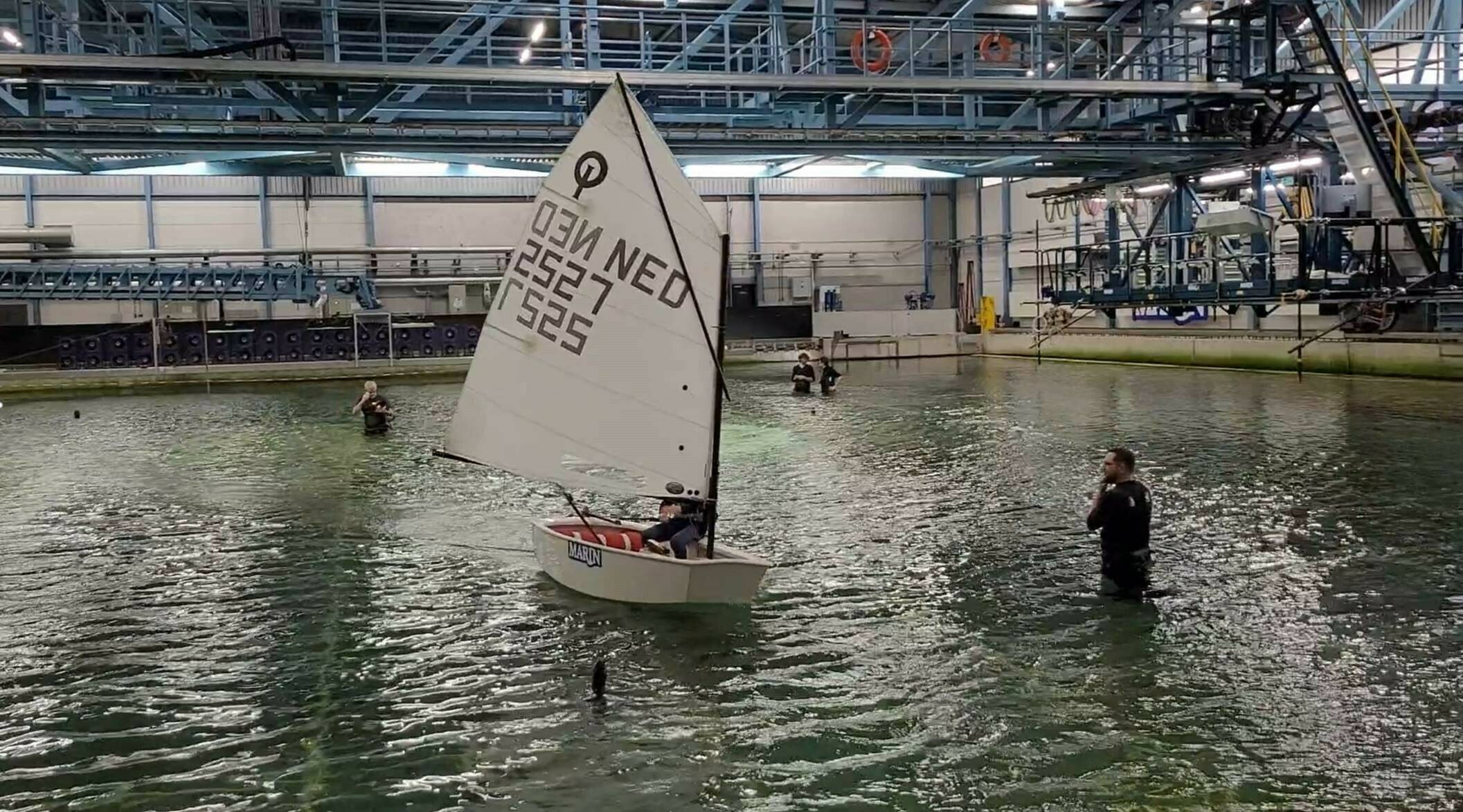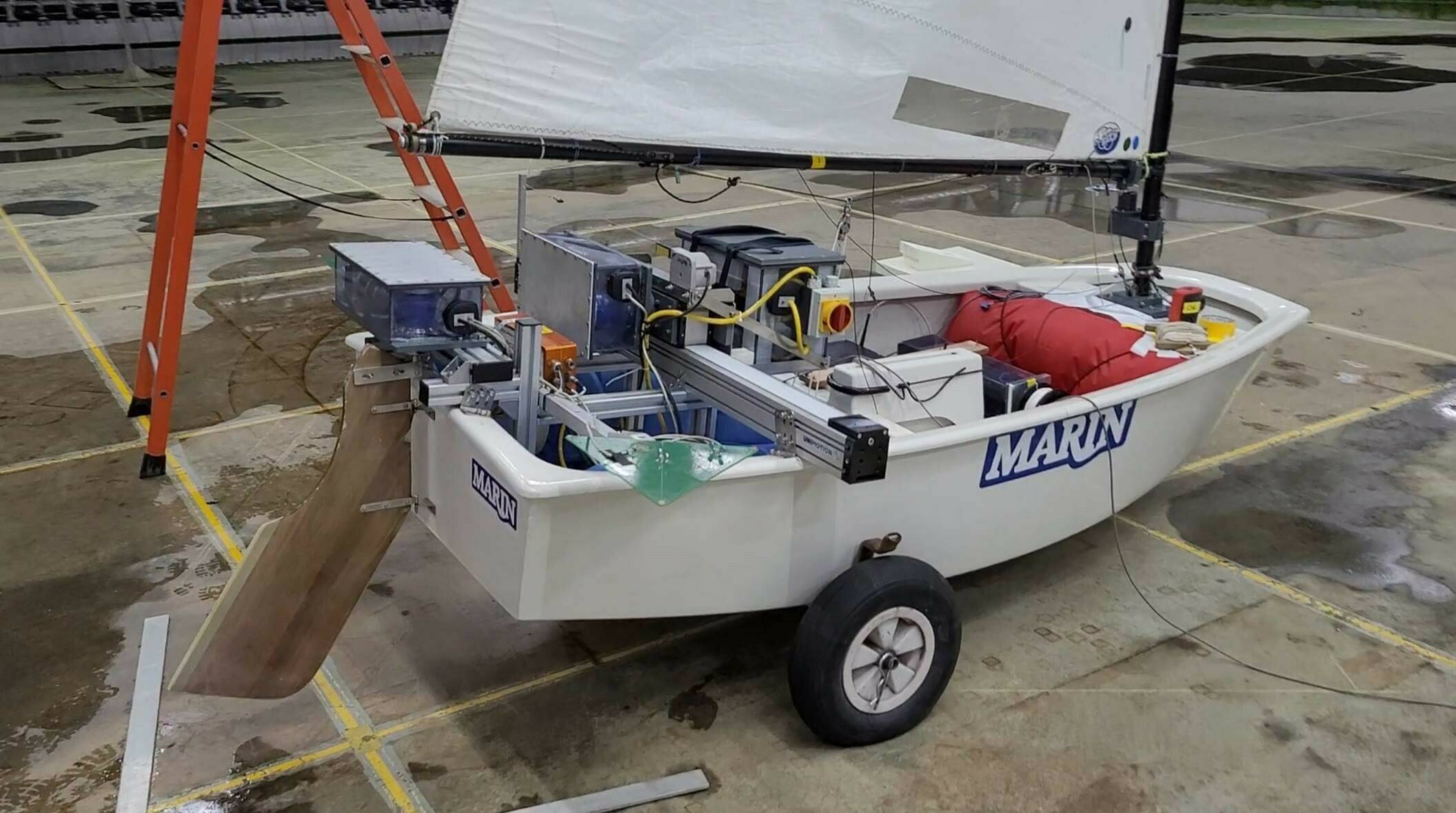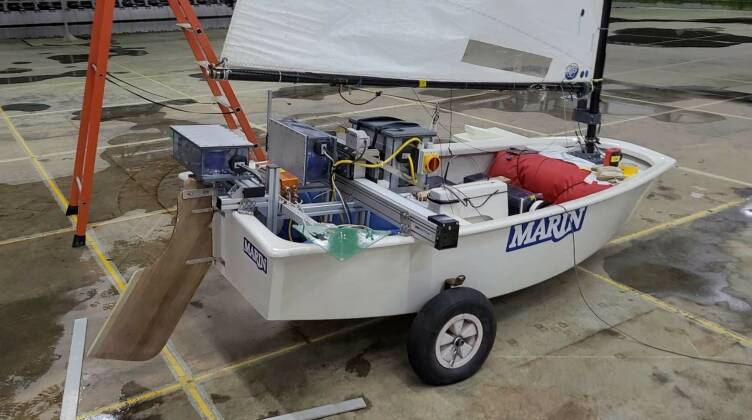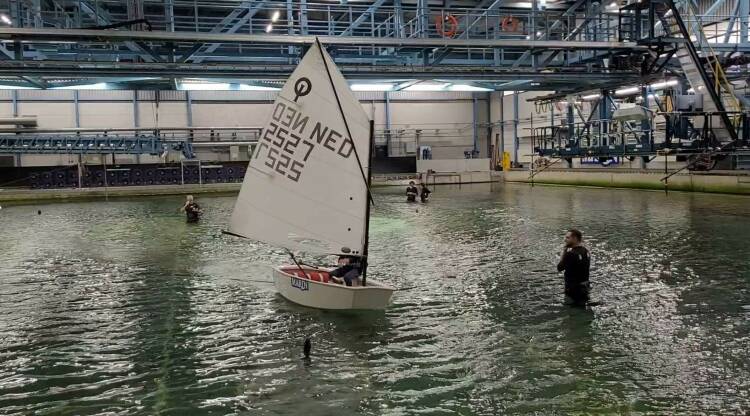June 2023, no. 136
News
BlueWeek
AI Sail
TopTier
CFD
Zero Emission
Foil Design
Traffic studies
F-series
Manxman ferry
Cover

Create a MARIN account to stay updated
Report

MARIN has launched AI Sail, a pilot project examining machine learning.
In this project, we will let an algorithm learn to sail an Optimist in our simulation and test environments with the overall objective of exploring the possibilities (and limitations) of Reinforcement Learning (RL) to control dynamic systems. This pioneering project will bring RL from simulation exercises into the physical world.
In our Strategy Plan 2022-2025 ‘Beyond the horizon’, we have adopted challenging perspectives for the future of the maritime sector and one of them is taking the lead in artificial intelligence (AI), with the sea effectively deployed as a ‘digital lab’. This is not because we intend to create a maritime future full of emotionless robots but because we recognise how powerfully AI can support human decisions, from design to operations.

“Can an algorithm learn how to sail an Optimist by using machine learning techniques?”
Our strategy focuses on two application areas of AI. The first is where AI has real-time interaction with people and systems, for example real-time operational decision support and autonomous operations on board, and the second is where AI helps to analyse the past and formulate trends, such as evaluating nautical risks or analysing energy and emissions performance.
Dedicated AI research
We have been actively working on AI since 2017 and today, we have a dedicated research programme on data science and AI, where we introduce AI techniques to the maritime domain. Combining our data science and domain expertise, we develop knowledge about how to apply these techniques to practical problems through different research projects.
The idea for AI Sail is based on the observation that children can intuitively learn how to sail in an Optimist, without understanding the details of aerodynamics and hydrodynamics. So, we are challenging ourselves and asking: can an algorithm learn how to sail an Optimist in a comparable way by using machine learning techniques?

Full-scale tests
In 2022, we defined the approach and performed a first try-out of sailing with an actual (full-scale) Optimist in our Offshore Basin and we determined the requirements for the simulation environment and the experimental setup.
One of the techniques used is RL, which is a subset of machine learning that deals with choosing actions in dynamic environments. As opposed to the more well-known supervised learning algorithms, RL does not directly learn from examples, but rather gathers experience through interaction. The benefits of this approach are the ability to find strategies beyond available examples and optimisation for long-term gains, instead of immediate returns.

“One of the techniques used is RL, which is a subset of machine learning that deals with choosing actions in dynamic environments.”
However, drawbacks can be a slower learning process and hard-to-define feedback on the performance during training of the RL model. Compared to control theory approaches, RL does not need any explicit modelling in the solution, allowing it to be used in environments where such modelling is not desirable or possible. We are developing knowledge on the acceleration of the learning process, while building the workflows necessary to seamlessly connect the simulation environments and physical test facilities.
This year we initially modified the Optimist to be operated and tested by remote control in the basin and we will fully train an RL model in a simulation environment and test its performance in upcoming basin experiments.
In October we will also host a public seminar on the progress, including a demonstration.
Work on Al Sail.
More info:







Report
June 2023, no. 136
Work on Al Sail.
However, drawbacks can be a slower learning process and hard-to-define feedback on the performance during training of the RL model. Compared to control theory approaches, RL does not need any explicit modelling in the solution, allowing it to be used in environments where such modelling is not desirable or possible. We are developing knowledge on the acceleration of the learning process, while building the workflows necessary to seamlessly connect the simulation environments and physical test facilities.
This year we initially modified the Optimist to be operated and tested by remote control in the basin and we will fully train an RL model in a simulation environment and test its performance in upcoming basin experiments.
In October we will also host a public seminar on the progress, including a demonstration.

“One of the techniques used is RL, which is a subset of machine learning that deals with choosing actions in dynamic environments.”
Full-scale tests
In 2022, we defined the approach and performed a first try-out of sailing with an actual (full-scale) Optimist in our Offshore Basin and we determined the requirements for the simulation environment and the experimental setup.
One of the techniques used is RL, which is a subset of machine learning that deals with choosing actions in dynamic environments. As opposed to the more well-known supervised learning algorithms, RL does not directly learn from examples, but rather gathers experience through interaction. The benefits of this approach are the ability to find strategies beyond available examples and optimisation for long-term gains, instead of immediate returns.

Our strategy focuses on two application areas of AI. The first is where AI has real-time interaction with people and systems, for example real-time operational decision support and autonomous operations on board, and the second is where AI helps to analyse the past and formulate trends, such as evaluating nautical risks or analysing energy and emissions performance.
Dedicated AI research
We have been actively working on AI since 2017 and today, we have a dedicated research programme on data science and AI, where we introduce AI techniques to the maritime domain. Combining our data science and domain expertise, we develop knowledge about how to apply these techniques to practical problems through different research projects.
The idea for AI Sail is based on the observation that children can intuitively learn how to sail in an Optimist, without understanding the details of aerodynamics and hydrodynamics. So, we are challenging ourselves and asking: can an algorithm learn how to sail an Optimist in a comparable way by using machine learning techniques?
“Can an algorithm learn how to sail an Optimist by using machine learning techniques?”

In this project, we will let an algorithm learn to sail an Optimist in our simulation and test environments with the overall objective of exploring the possibilities (and limitations) of Reinforcement Learning (RL) to control dynamic systems. This pioneering project will bring RL from simulation exercises into the physical world.
In our Strategy Plan 2022-2025 ‘Beyond the horizon’, we have adopted challenging perspectives for the future of the maritime sector and one of them is taking the lead in artificial intelligence (AI), with the sea effectively deployed as a ‘digital lab’. This is not because we intend to create a maritime future full of emotionless robots but because we recognise how powerfully AI can support human decisions, from design to operations.
MARIN has launched AI Sail, a pilot project examining machine learning.
July 2023, no. 136







More info:







